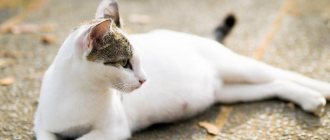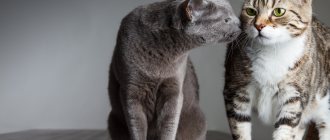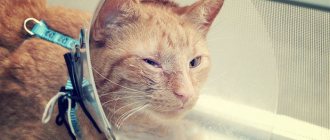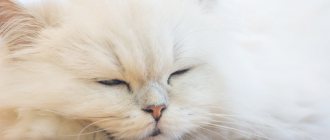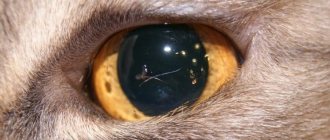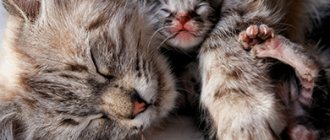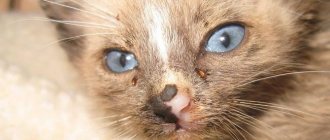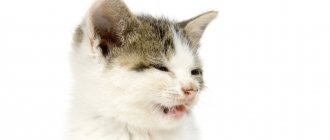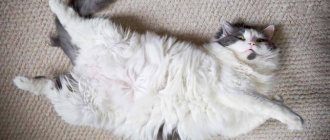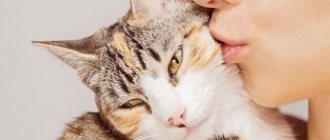Bloating, or flatulence, is an excessive accumulation of intestinal gases. If a kitten has a bloated belly for a long time, then there is a high probability of a pathological cause. Some of the factors can cause the death of a small pet. A timely visit to a veterinary clinic will help you avoid unpleasant consequences.
Improper animal nutrition
Unfortunately, most people do not think that the stomachs of small kittens are not adapted to the food that adult cats eat. In this case, tiny pets can be compared to newborn children. However, they are in no hurry to feed babies with the everyday food of adults, but with kittens the situation is different. It is poor nutrition that is the reason why a kitten gets a big belly. After all, food simply is not digested in their small stomach.
This problem can be solved very simply. These days, taking care of fur babies has become much easier. The stores sell a huge amount of all kinds of food that are designed for the age of the animals.
Fat kitten: how is this possible?
Healthy kittens invariably seem robust to us - they have plump legs, a short tail, almost no neck and a relatively large belly. We have already discussed the danger of a large belly in adult pets in the article “Where does a cat’s belly fat come from,” but is this the case with cat “children”?
The newborn period of a kitten lasts up to about a month, when the baby sleeps 80% of the time and spends the rest of the time eating, because he needs to actively grow. By the age of a week he will double his weight, by a month he will increase it by about 5 times!
At the same time, we cannot say that the kitten is fat: the increase is due to growth and development, which consumes all the energy received by the body from food. In addition, up to a month, baby animals store only brown fat - a special tissue within which very rapid metabolic processes occur, aimed at obtaining energy in the form of heat.
At an older age, a kitten may begin to accumulate ordinary white fat, but there is not much of it: the greater mobility of babies and intensive growth simply do not allow them to accumulate a lot of fatty tissue.
Constipation in a kitten
Constipation can also be caused by poor diet. It is quite simple to determine that a kitten has a large belly due to the accumulation of feces. If the cause of bloating is constipation, your pet's stomach will be hard and dense.
In this case, it is recommended to purchase special medications that can eliminate the cause of bloating. You can also give the kitten a light massage by rubbing the belly with smooth circular movements. Another good option for eliminating constipation is to feed the animal fermented milk products, which will facilitate easier excretion of feces.
Diagnosis and treatment
Therapy is aimed at eliminating the cause of bloating. Symptomatic treatment is prescribed.
If the doctor determines that flatulence is caused by poor nutrition, then he prescribes an appropriate diet. Your cat's food should consist of foods low in carbohydrates.
What to do and how to help your cat before visiting the clinic? As first aid, you can give her a cleansing enema (if you know how) and give her the following medications:
- Traumeel (to relieve spasms).
- Activated carbon, Polysorb (to remove gases).
- Lactoferon (to avoid the development of putrefactive microflora).
- Liarsin (to normalize the digestion process).
Homeopathic remedies (Nux vomica-homaccord, Engistol) have proven themselves well in the treatment of flatulence and intestinal disorders. Dill water helps, as well as infusions of cumin, chamomile, and fennel.
Binge eating
Why does a kitten have a bloated belly? Due to overeating. It is very simple to understand that the stomach is swollen for this very reason. All you need to do is watch your pet. If the animal moves little and sleeps almost the whole day, this means that the problem arose due to overeating. Overfeeding kittens can cause not only a decrease in activity, but also constipation.
Dealing with the problem of overeating is easy. In order for the kitten to receive the right amount of food and vitamins, portions should be prepared correctly. Food should not sit in a bowl 24/7. To correctly calculate the required amount of food, you can contact specialists.
What do we have to do?
Ways to cope with bloating directly depend on the reasons that caused the painful condition.
If disorders are caused by poor nutrition, you must:
- adjust the diet;
- choose age-appropriate food;
- Make sure your kitten drinks more clean water;
- stimulate activity by playing with the animal more often.
The following methods are effective for constipation:
- abdominal massage (clockwise, with gentle movements without pressure);
- Add a few drops of Vaseline oil to food 2-3 times a day;
- in advanced cases, an enema is given;
- If the kitten is prone to constipation, he should be given fermented milk products from time to time.
Milk
For helminthic infestations, anthelmintic drugs are used.
Serious diseases of internal organs
So, the kitten has a big belly. Why does this happen? If your pet is eating properly, but its tummy is still swollen, this may indicate serious illness. It is impossible to determine such a disease by eye. Therefore, pet owners must take their kitten to the veterinarian.
Thus, the cause of bloating can be serious problems with the liver, malignant tumors, improper functioning of the pancreas, as well as abnormalities in the functioning of the immune system. In addition, bloating can be a consequence of an obese kitten. But in this case, not only the pet’s stomach will show discomfort. The kitten itself will become fat and gain significant weight.
Of course, this is not the entire list of possible causes of bloating in a kitten. Only an experienced veterinarian with special equipment can see the full picture. So, if the animal has become lethargic and drowsy, you should pay attention to this and immediately consult a doctor.
Signs of bloating
If the pet has just eaten, then the rounded shape is quite normal. But if a kitten’s stomach is constantly bloated, regardless of food intake, this should alert the owner. In most cases, this condition is accompanied by additional symptoms.
- Urge to vomit. One-time ones most likely indicate overeating, but if the process is systematically repeated, then it could be poisoning or an infectious disease.
- Diarrhea. It can occur along with vomiting or as an independent phenomenon. Indicates poor nutrition, the presence of parasites, and intestinal infection.
- Weight loss. Despite the fact that the pet is losing weight, the belly remains inflated.
Little belly
- Inflammation of the oral mucosa , gingivitis. They signal the presence of disturbances in the gastrointestinal tract. Most likely, harmful substances have entered the stomach, causing irritation of the stomach walls and pain.
- Presence of helminth remains in excrement. The body is heavily infested with parasites. This condition is especially dangerous for small kittens, since the toxic waste products of worms quickly poison the body.
- Perverted food preferences. If the diet lacks vitamins and essential microelements, the pet may become interested and try to eat inedible or poorly digestible foods.
- Flatulence. A very common symptom. The animal is worried, rushing about, and cannot find a place for itself.
- Profuse drooling.
- Sometimes lethargy and decreased activity appear.
If, along with the fact that the kitten has a large tummy, it exhibits one or more of the listed signs, then the cause of the bloating can be determined from them.
Peritonitis
Why does the kitten have a big belly, but he himself is thin? One of the most dangerous problems that causes bloating is ascites. In this case, the kitten suffers from the accumulation of fluid in the abdominal cavity. Peritonitis is very dangerous and requires immediate medical intervention.
What to do if your kitten has a bloated belly? What to do? It is necessary to determine whether the pet actually has ascites. To do this, it is recommended to pick him up and hold him in an upright position for a while. If the animal’s figure resembles a pear (which occurs as a result of liquid flowing down), and after lowering the kitten’s belly again looks like a ball, then there can be no doubt. Therefore, do not hesitate, go to the doctor.
Main reasons
Frequent constipation
Often a baby’s round, bloated tummy is a consequence of problems with bowel movements. Constipation is often caused by such common diseases in cats as dysbacteriosis, helminthiasis, and disruption of the gastrointestinal tract. In addition, cats often have stomach pain and are unable to go to the litter box due to stress. The absence of bowel movements for 2-3 days should be a cause for concern and an urgent visit to the hospital.
Poor nutrition
This is often the reason why a kitten has diarrhea and a bloated belly. As soon as a kitten appears in the house, the owner needs to think about quality nutrition and, if necessary, seek advice from a veterinarian. Balanced, healthy food is the key to proper growth, development and activity of the cat. It is necessary to refuse food from the human table, use high-quality factory food instead, or prepare special dishes for your baby that his body will digest without problems.
It is important to prevent your kitten from overeating. Due to excessive consumption of food, the stomach not only swells, but also causes increased gas formation, bloating, and colic.
Gases in the intestines
Gas formation is a consequence of the proliferation of worms, which leads to emaciation of the pet.
If the kitten has a large belly, loose stools, and is constantly bothered by intestinal gases, most likely the cause of this condition is a helminthic infestation. If the number of worms constantly increases, the baby becomes thin, and his appetite is increased, but it may also be reduced. When worms are actively breeding, the tummy is tight and inflated. Sometimes a lump of parasites comes out along with the feces. It is necessary to select an antihelminthic medicine for your pet as soon as possible, because gases in this case are not the biggest problem. Untimely treatment of the animal leads to its death.
Binge eating
A kitten, accustomed to eating more than moderation, soon becomes fat, and excess weight negatively affects the health of the animal, especially if it has a tendency to congenital heart diseases. In addition, the digestive system cannot always cope with large volumes of food entering the stomach and intestines. As a result, food begins to rot and ferment inside, the kitten's tummy swells, and bloating is often accompanied by pain and discomfort.
Worm infestation
A common cause of cramps and flatulence in cats and kittens. A swollen, tense and enlarged abdomen indicates that there are a lot of parasites in the intestines. A worm that has grown to a large size injures the intestinal mucosa and leads to disruption of its functioning. Therefore, if the kitten has a hard belly and there are all signs of infection, you need to urgently visit a doctor and find the appropriate therapy.
Diseases
An enlarged abdomen, which takes the shape of a pear, indicates a disease such as abdominal dropsy.
Often the reason that a cat has a big belly is various internal diseases, among which the following are common:
- Abdominal dropsy. With this pathology, the kitten's tummy is enlarged at the bottom. If you lift the baby, you will notice that the abdomen is shaped like a pear. Bloating is often accompanied by rumbling, intestinal upset, and pain.
- Liver diseases. With hepatitis, in addition to the fact that the stomach is swollen, the whites of the eyes and the oral mucosa are yellow. There is an increase in body temperature, while the nose is hot and dry. If cirrhosis develops, the kitten is constantly swollen and the belly is very distended. The baby refuses to eat and quickly loses weight.
- Gastrointestinal cancer. It is more often diagnosed in adults, but small kittens are not immune from cancer. In addition to the fact that the cat has a dense stomach, symptoms such as pain, indigestion, and intestinal upset are disturbing. Often, swellings appear under the jaw, which are enlarged lymph nodes. The animal is lethargic, loses appetite and weight.
- Infectious peritonitis. This is a dangerous disease in which infectious inflammation of the abdominal organs occurs. In addition to the fact that the abdomen is tense, swollen and elastic, the animal is worried about severe diarrhea, vomiting, fever, and a critical increase in body temperature.
- Pancreatitis. When the pancreas is inflamed, it is noticeable that the pet’s tummy is hard, very swollen, and painful.
Pregnancy
In the case of free access to the street, pregnancy may be the reason for the roundness of the pet.
If at the age of 6-9 months the owner notices a large belly in the cat, there is a high probability that the pet has become pregnant. Most often, this situation occurs when an animal freely visits the street. If the owner does not plan to breed offspring, it is advisable to sterilize the animal before the first heat. A sterilized cat has fewer health problems, and the owner does not need to worry about what to do with the animal during sexual “hunting.”
